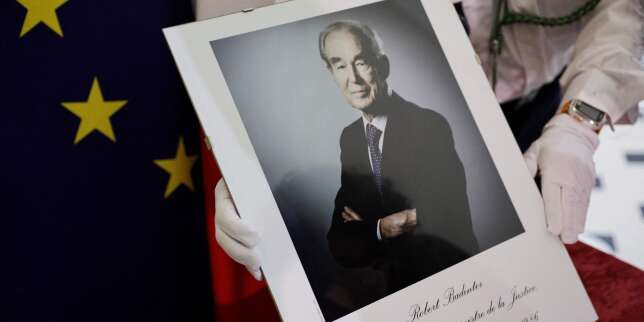Op-Ed
Denis Salas
Choose
Choose Denis Salas writes that the previous justice minister all the time linked his style for archives to the struggles of his time, demonstrating how speedy reforms are enriched and knowledgeable by in depth heritage.
Revealed in the present day at 11:33 am (Paris) Time to 4 min. Lire en français
Subscribers solely
On the event of the 40th anniversary of the abolition of the dying penalty in 2021, Robert Badinter recounted, within the interview he gave to Sylvie Humbert, Hervé Leuwers and myself for our e-book Les Chemins de l’Abolition de la Peine de Mort: De Cesare Beccaria à Robert Badinter (“The Paths to the Abolition of the Loss of life Penalty: From Cesare Beccaria to Robert Badinter”), the day of September 30, 1981. On the day the Sénat voted to abolish the dying penalty, he discovered himself within the seat as soon as occupied by Victor Hugo. When the results of the vote was introduced, he positioned his hand on the author’s commemorative plaque, as if to really feel his presence. It was 12.50 pm. At that second, their shared want for a “pure, easy and definitive abolition” was lastly achieved. He concluded the interview in an virtually whispered voice: “It was a gorgeous morning, the fog had lifted… I left the Sénat, walked via the Jardin du Luxembourg the place there have been youngsters enjoying, sat down and checked out them, I felt such a robust and particular feeling… the dying penalty now not existed, it was over.”
Badinter leaves us having fulfilled his mission with the identical sense of accomplishment. A lawyer conversant in the courts, he made judicial historical past, its rites, and its gamers his main ardour. As justice minister, he requested the file on Henri Désiré Landru, a infamous prison of the Belle Epoque, and was outraged to be taught that it had not been archived. In a ministry unconcerned about its reminiscence and heritage, he based the Affiliation Française pour l’Histoire de la Justice (French Affiliation for the Historical past of Justice), chaired for a very long time by Pierre Truche, to whom he had entrusted the prosecution within the Klaus Barbie trial.
For Badinter, historical past is written within the current. By way of these two shared passions, historical past and justice, he linked his style for archives to the struggles of his time. The speedy reforms have been enriched and knowledgeable by in depth heritage. His workplace was adorned with traces of the battles of yesterday and in the present day: the decree abolishing slavery in 1791, the unique textual content of the Declaration of the Rights of Man, the facsimile of Zola’s “J’accuse” in L’Aurore, in addition to quite a few autographs and press cartoons on the abolition of slavery in 1981.
‘The responsibility of ingratitude’
Venturing into the discreet shadows of his library, we uncover his contribution to the reason for justice. The texts are there for all to see: the one permitting people to convey instances earlier than the European Court docket of Human Rights in 1981, the protocol to the European Conference on Human Rights prohibiting the re-establishment of the dying penalty in 1986, and the texts of the Peace Fee for the previous Yugoslavia, which he chaired in 1992. On his desk, his newest e-book, Vladimir Poutine : l’Accusation (“Vladimir Putin: the Accusation,” 2023), co-written with Bruno Cotte and Alain Pellet, is a ruthless, well-argued indictment of the Russian president. Confronted with the conflict of aggression unleashed on Ukraine in 2022, as within the Balkan conflict of yesteryear, and each time Europe is threatened, he reminds us that peace requires justice. “I’m unshakeable with regards to justice and the regulation,” he typically mentioned.
You will have 55% of this text left to learn. The remaining is for subscribers solely.
Vous pouvez lire Le Monde sur un seul appareil à la fois
Ce message s’affichera sur l’autre appareil.
-
Parce qu’une autre personne (ou vous) est en prepare de lire Le Monde avec ce compte sur un autre appareil.
Vous ne pouvez lire Le Monde que sur un seul appareil à la fois (ordinateur, téléphone ou tablette).
-
Remark ne plus voir ce message ?
En cliquant sur « » et en vous assurant que vous êtes la seule personne à consulter Le Monde avec ce compte.
-
Que se passera-t-il si vous continuez à lire ici ?
Ce message s’affichera sur l’autre appareil. Ce dernier restera connecté avec ce compte.
-
Y a-t-il d’autres limites ?
Non. Vous pouvez vous connecter avec votre compte sur autant d’appareils que vous le souhaitez, mais en les utilisant à des moments différents.
-
Vous ignorez qui est l’autre personne ?
Nous vous conseillons de modifier votre mot de passe.
Lecture restreinte
Votre abonnement n’autorise pas la lecture de cet article
Pour plus d’informations, merci de contacter notre service industrial.














